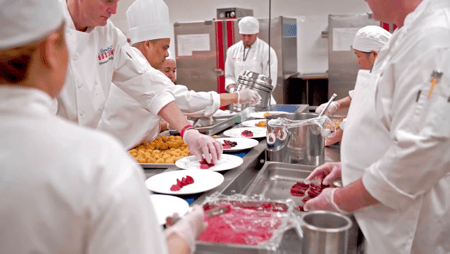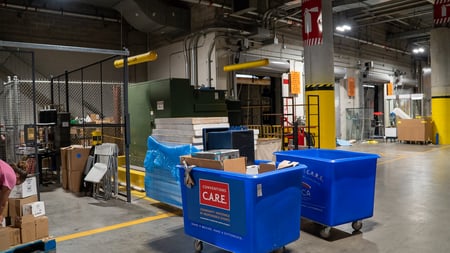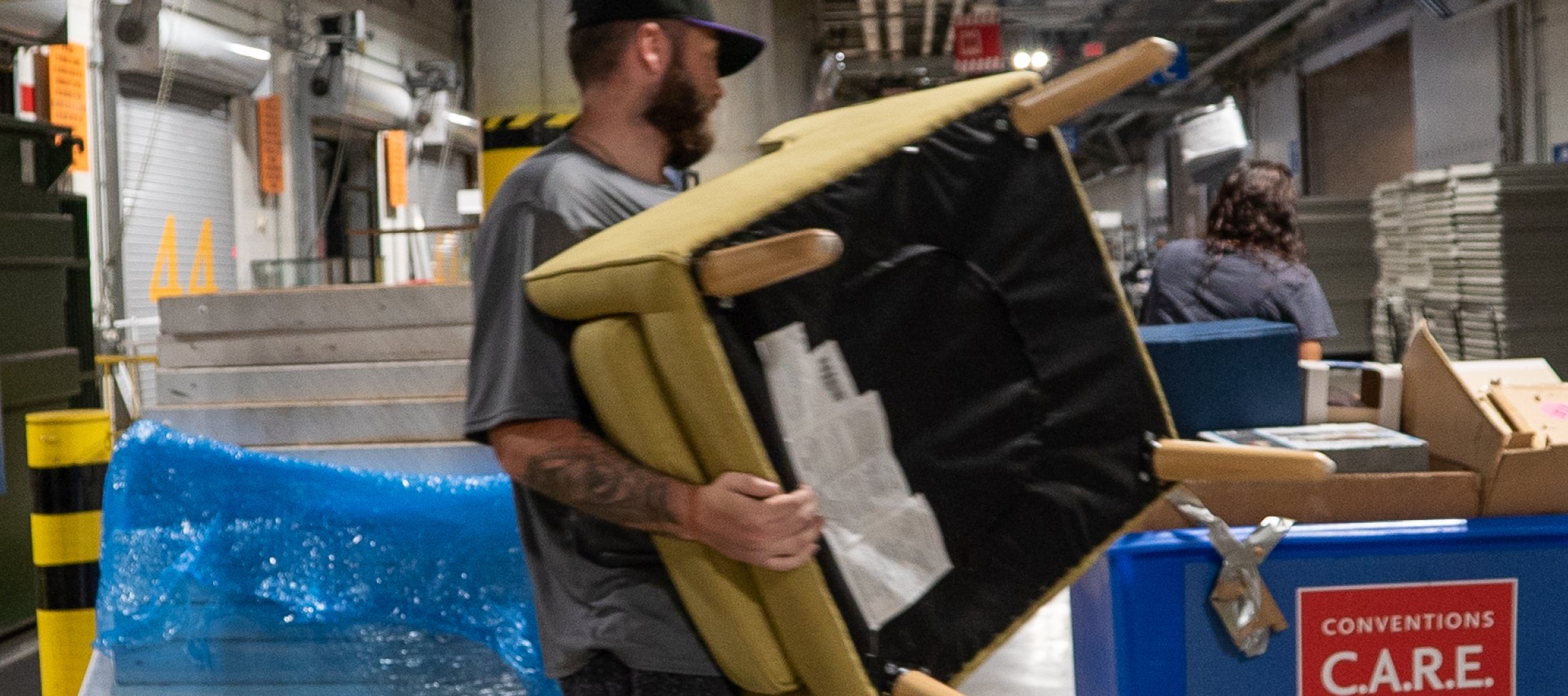At the Boston Convention & Exhibition Center (BCEC) and Hynes Convention Center, our food, transportation, and post-event reuse efforts help create a greener, cleaner future. In the second part of our three-part series on sustainability practices at Boston’s Convention Centers, let’s break down how our dining services stay mindful of sustainability, as well as our transportation team and our Conventions C.A.R.E. program that recycles and donates goods after events.
Levy Restaurants: Waste Not
The catering team at Levy Restaurants, the exclusive food and beverage supplier at Boston’s Convention Centers, partners with local vendors such as Baldor Foods, Sysco Foods, Gordon’s Foods, Dole and Bailey, and Ipswich Shellfish Company. These vendors source food as close as they can to New England, ideally within 450 miles of the BCEC and the Hynes. Depending on the season, upwards of 75% of food comes from local farms.
Each vendor is committed to sustainability in its own way, and a commitment to farm-fresh food is always a priority. Baldor Foods, for example, prides itself on working with local farms and using every piece of the vegetable by finding new ways to incorporate traditionally unused parts, like stems or peels, into different food processes. Sysco has been incorporating electric vehicles into its fleet and is set to electrify 35% of its fleet by 2030. Ipswich Shellfish Company, our seafood provider, works with certified fisheries that practice safe and responsible fishing.
 When the food reaches the kitchens, our Head Chefs, Kaeo Yuen at the BCEC and Jonathan Saiff at the Hynes, work with their teams to craft delicious meals with sustainability in mind. Chef Kaeo says a huge part of sustainability lies within the people making the food, and he chooses his highly-praised people over machines to complete tasks whenever possible.
When the food reaches the kitchens, our Head Chefs, Kaeo Yuen at the BCEC and Jonathan Saiff at the Hynes, work with their teams to craft delicious meals with sustainability in mind. Chef Kaeo says a huge part of sustainability lies within the people making the food, and he chooses his highly-praised people over machines to complete tasks whenever possible.
In addition to the people, the kitchen is also set up for sustainable measures including mostly electric appliances with minimal gas consumption. For the equipment that does need gas, Levy uses an eco-friendly fuel source partly derived from plants, which releases fewer emissions.
After food preparation and consumption comes the next step in the sustainability process – waste management after an event. The excess food waste from production and what is left over is tracked and categorized by Levy’s Waste Not 2.0 Program. The program measures excess food and why it went unused, organizing the waste into 4 different categories:
- Unavoidable food waste: Waste that is unavoidable during food production like bones, shells, fat, stems, etc.
- Red waste: Food that has been declared poor quality, dropped, burned, or unsafe for consumption.
- Plate waste: Food hat has been left on plates or thrown away from guests.
- Catering leftovers. Leftover food that has been untouched by guests and/or overproduced because of the scale of the event.
Unavoidable food waste during production is collected in red trash barrels, because much of it cannot be used when composting. The rest is put into yellow trash barrels that are collected by Save That Stuff (STS). STS collects the waste, and this food waste is used in anaerobic digestion to create energy. Annually, the BCEC alone sends over 600,000 pounds of waste to be used for anerobic digestion, with any residuals being pelletized into fertilizer and land applied. In the kitchen, there are also various composting bins, which are used in the BCEC’s Chef’s Garden.
Aside from waste discarded or sent to STS, there are often leftovers. Food that is inspected and deemed safe for consumption after the event is over is stored and donated to various organizations around Boston, such as Pine Street Inn, Food for Free, and Rescuing Leftover Cuisine.
Smaller events can produce as many as 100 pounds of consumable food to be donated, while larger events can produce upward of 600 pounds. Annually, the BCEC donates over 5 tons of food to both Pine Street Inn and Food for Free, helping combat food insecurity through sustainability practices centered around great food and community.
MCCA Transportation Team: Reduce Emissions
While Levy Restaurants helps keep food waste to a minimum, our transportation team does the same with personal vehicles and carbon emissions.
Through a key partnership with the City of Boston, Boston’s Convention Centers are accessible via Silver Line buses that provide direct access from Boston Logan International Airport. The Silver Line is complimentary from Logan Airport and stops at the Seaport/World Trade Center station across the street from the BCEC. Hynes Convention Center also has its own stop on the Green Line subway.
Along with working with the MBTA, the MCCA Transportation Team continues to contribute to our sustainability efforts:
- Various shuttle buses and water ferries to reduce personal vehicles
- Electric vehicle purchases ahead
- 7 EV charging stations at the BCEC
Conventions C.A.R.E.: Provide for Local Nonprofits
Finally, an important value-added service promoting sustainability – the Conventions C.A.R.E. (Community Assistance by Responsible Events) program – steps in at the end of our convention center events. This program collects clean, usable, non-perishable donations from exhibitors after conventions and delivers them to local nonprofits around Boston.  At the end of every event or meeting, blue Conventions C.A.R.E. bins are placed throughout the facility for exhibitors to donate what they would otherwise leave behind. Learn more about Conventions C.A.R.E. and its impact in our community.
At the end of every event or meeting, blue Conventions C.A.R.E. bins are placed throughout the facility for exhibitors to donate what they would otherwise leave behind. Learn more about Conventions C.A.R.E. and its impact in our community.
Sustainability measures are a focus of the daily operating strategy of the MCCA. Stay tuned for the final part of our three-part series! See the ongoing sustainability efforts at Boston’s Convention Centers through our Green Building Practices.
To learn more, check out Part 1 of our sustainability series, which explores our facilities!
This blog post was written by our intern Ian McGrath who is a Sophomore at UMass Boston majoring in Communications and minoring in English and Psychology.



